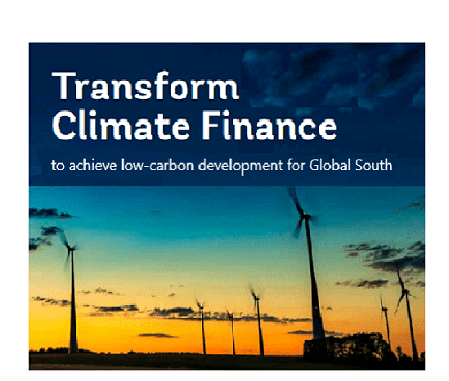
A bloc of developing countries has accused wealthy nations of a lack of transparency in their approach to climate financing while seeking to “dilute their legal obligations” to help poorer economies.
A China-led bloc of four newly industrialised countries said rich countries needed to pay up “trillions of dollars” in climate finance, adding that developed countries were “backtracking” on their earlier pledges.
“Historical emissions and the use of the world’s carbon space are not fair, with developed countries having more historical emissions than their share of the global population,” the bloc said, citing a report from the Intergovernmental Panel on Climate Change (IPCC).
Rich nations needed to fill a “$100 billion gap in climate finance commitments,” it said, adding that they needed to increase climate financing for developed countries “from billions of US dollars per year to trillions of US dollars.”
The group (known as BASIC) issued the statement late on Wednesday, following a meeting between ministers from the bloc’s four countries — China, India, Brazil and South Africa — in Wuhan this week (July 2024). All are members of the BRICS group.
As of 2022, China was the biggest current emitter of greenhouse gases in the world, followed by the United States and India. However Western countries, especially the US, contribute much higher per capita emissions and are historically by far the main contributors to greenhouse gases, which accumulate in the atmosphere and persist for long periods of time.
Both China and India have made significant moves to reduce their emissions and transition towards carbon neutrality, including spending billions of dollars on renewables and decarbonising their oil companies. They are also now working towards adopting emerging climate technologies like Carbon Dioxide Removal (CDR) and Carbon Capture, Utilisation and Storage (CCUS).
But both countries continue to remain seriously reliant on coal to meet increasing power demands, especially as they tackle debilitating heat waves brought on by rapid climate change. Both China and India have repeatedly argued that the onus lies on developed countries to provide climate finance to developing countries such as them. In China’s case, that demand has lasted for more than a decade-and-a-half.
12 billion tonnes of emissions
Since as far back as 2008, China has called on rich countries to help developing nations tackle climate change, citing their much higher per capita emissions and long history of polluting the air.
In recent years, India has also said it was “deeply unfair” to blame India and China for the ongoing climate crisis. The BASIC bloc reiterated those statements on Wednesday, while also calling on developed countries to fast-track their climate pledges.
The group said it had “serious concern” about developed countries’ gaps in implementing their climate pledges, adding that their mitigation efforts were “insufficient”.
Developed countries need to “achieve net zero greenhouse gas emissions significantly earlier than 2050, preferably by 2030, and immediately achieve net negative greenhouse gas emissions,” it said.
BASIC’s claims come on the heels of multiple recent reports that show developed countries — with much lower populations than India and China — have continued to fuel the global increase in carbon emissions. Increasing oil and gas exploration by rich nations could emit 12 billion tonnes of carbon emissions this year, the Guardian reported as recently as Wednesday. In contrast, China and India are well on their way to manage their emissions.
In August last year, Indian officials told the United Nations that the country had managed to cut its emissions rate by 33% in the 14 years since the signing of the Copenhagen Accord. Meanwhile, China is likely to have hit its peak carbon emissions last year, after its use of coal to produce electricity hit a record low in May (2024).
Lack of accountability, leadership ‘vaccum’
In its damning statement, BASIC also accused developed countries of a lack of transparency in their approach to climate financing and seeking to “dilute their legal obligations” to help developing nations.
“There are inconsistencies in the accounting of climate finance by developed countries, which seriously undermines trust and legal certainty,” the statement said.
Those claims are backed by data too. The United States, for instance, provided no new money to UN’s the Green Climate Fund last year and has overall shelled out only $2 billion out of the total $3 billion it pledged nine years ago.
Furthermore, wealthy nations are now reaping billions of dollars in economic rewards from their $100 billion climate pledge meant to help developing economies. They are doing so by channeling money from the programme back into their own economies, according to Reuters investigation in May.
Meanwhile, China and India have already provided substantial funding to fellow developing countries — a much as $1,235 million and $765 million, Carbon Brief noted last year.
Despite those gaps, developing countries are now resorting to unilateralism and protectionism, BASIC countries said.
They cited Europe’s Carbon Border Adjustment Mechanism (CBAM) as one such tool. The carbon tax mechanism is expected to cost India 0.05% of its Gross Domestic Product (GDP).
BASIC said developed countries had, in effect, created a “leadership vacuum” in climate politics.
In contrast, developing countries were providing the vast majority of critical minerals and rare earths needed for the global green transition and also accounted for more than two-thirds of the world’s wind and solar projects, the bloc noted.
As a result, the biggest goal of the upcoming COP29 conference in Azerbaijan should be setting new climate financing targets for developed countries, and to ensure it flows to developing nations transparently, it added.
Source: Asia Financial, July 25, 2024. https://www.asiafinancial.com/china-india-ask-rich-nations-for-trillions-in-climate-finance